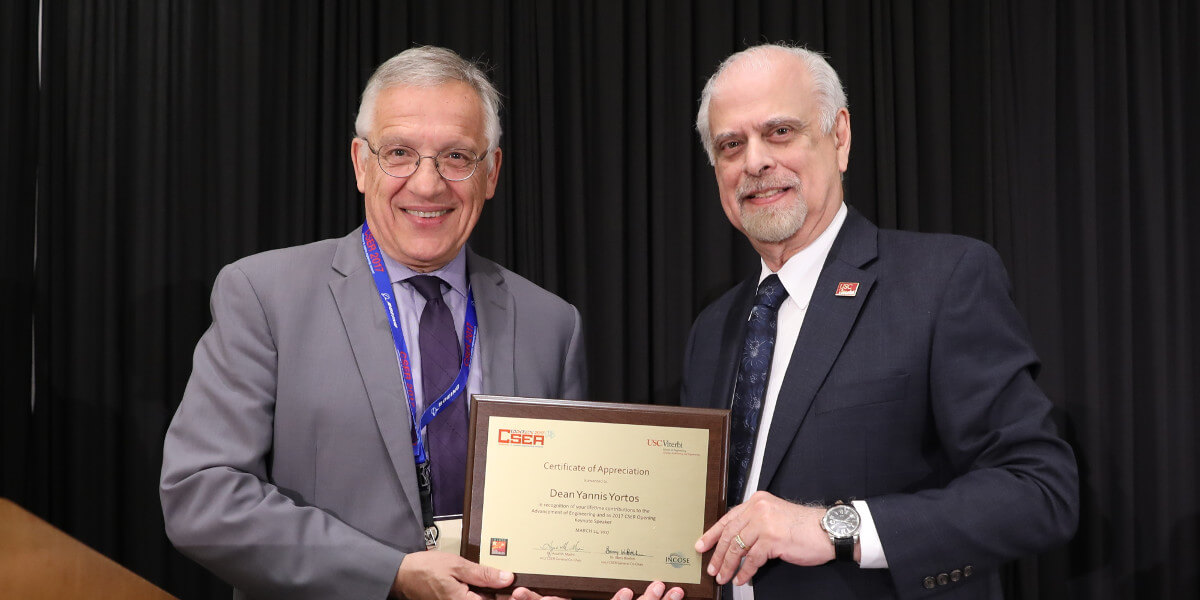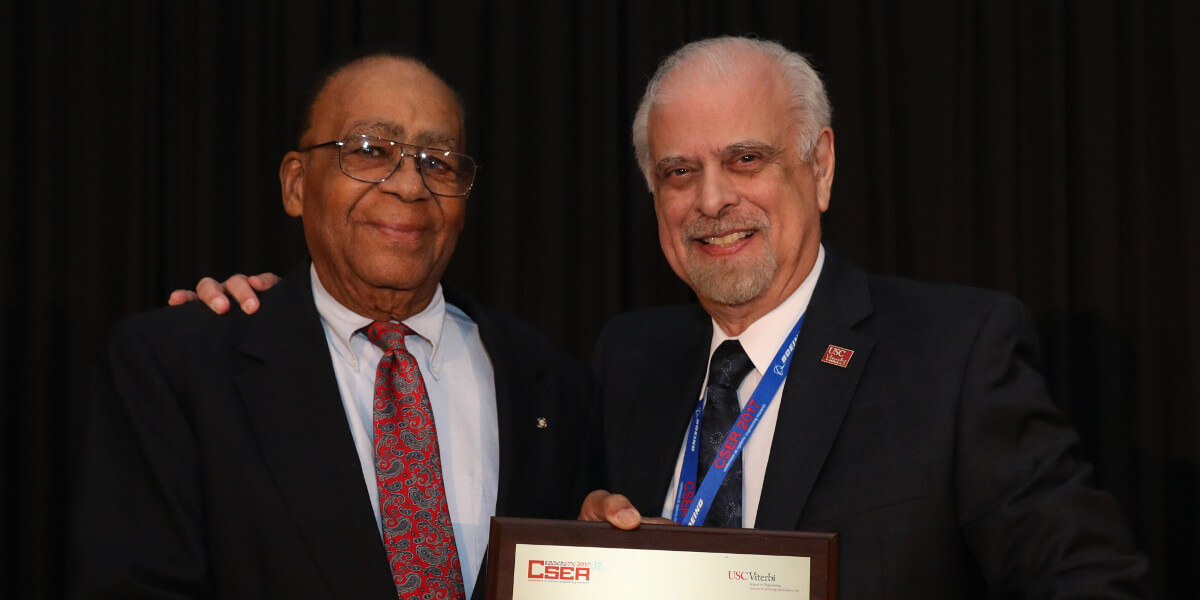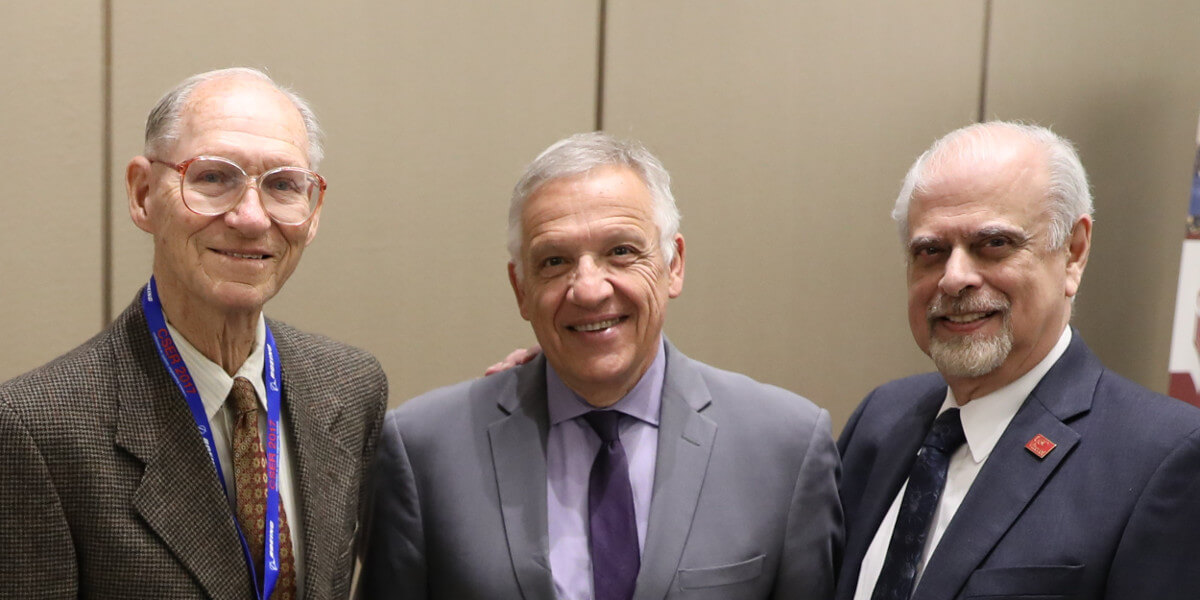
Viterbi School Dean Yannis C. Yortsos receiving a Certificate of Appreciation for lifetime contributions to the engineering profession from Professor Azad M. Madni, CSER general co-chair. Photo courtesy of SAE Program
The Conference on Systems Engineering Research (CSER) held its 15th annual event in March at the Crowne Plaza Hotel in Redondo Beach, Calif. The conference was hosted by USC Viterbi School of Engineering’s Systems Architecting and Engineering (SAE) program, with support provided by the International Council on Systems Engineering (INCOSE).
Co-founded by SAE and the Stevens Institute of Technology, CSER offers researchers an opportunity to present and discuss their work in systems engineering, an interdisciplinary field responsible for the development and management of complex systems and projects such as spacecraft design and healthcare systems integration. Currently, this field is undergoing a major transformation driven by the increasing complexity of systems and technical advances.
“Systems in the 21st century are becoming increasingly hyper-connected and consequently more complex. It is becoming apparent that traditional systems engineering methods and tools no longer suffice,” said Azad M. Madni, USC Professor of Astronautics and INCOSE Fellow and Pioneer, who has co-chaired this conference for the last 10 years.
“Researchers in government and academia have recognized this trend and are actively engaged in transforming systems engineering to ensure that the new methods will better support systems verification and testing and will scale with system complexity,” he said.
Madni, a recent recipient of the Orange County Engineering Council’s Engineer of the Year Award and the Engineers’ Council Engineering Educator of the Year Award, recognized that convergence will play an integral part in the ongoing transformation. He defined the field of “transdisciplinary systems engineering” in his most recent book, Transdisciplinary Systems Engineering: Exploiting Convergence in a Hyper-Connected World.

John Brooks Slaughter, CSER Banquet Speaker, with Azad M. Madni, CSER general co-chair. Photo courtesy of SAE Program
In his book, Madni discusses various trends that are enabled by the union of engineering with other disciplines and how these trends will shape the future of systems engineering. This book inspired the central theme of this year’s CSER: “Disciplinary Convergence: Implications for Systems Engineering Research.”
“The central idea is that problems that looked intractable when viewed from the lens of a single discipline can become tractable when viewed through a cross-disciplinary lens,” Madni said. “Where disciplines connect is where new insights emerge and new knowledge is created.”
As the banquet speaker, John Brooks Slaughter, former director of the National Science Foundation (NSF) and current USC Professor of Education and Engineering, talked about how transdisciplinary work, like Engineering +, a phrase coined at USC Viterbi in 2009, is transforming engineering.
“When I was in undergraduate school, engineering education consisted of a set of silos: civil, chemical, electrical, industrial… But today, we understand the folly and uselessness of such differentiation. The fusing of those disciplines with the biological, material, information and computer sciences has dramatically changed the field of engineering. And systems engineering is at the intersection of that transformation,” said Slaughter.
The conference was attended by well over 300 guests, including many international researchers. For the 15th anniversary, CSER organizers introduced new event programing which included four educational tutorial courses: cyber-physical systems, model-based systems engineering, data analytics and systems thinking, all of which had maximum enrollment.

Barry Boehm and Azad M. Madni, CSER general co-chairs, with USC Viterbi School Dean Yannis C. Yortsos (center). Photo courtesy of SAE Program
In recognition of their hard work putting together the event, Madni awarded several conference organizers with certificates of appreciation, including Marilee Wheaton for moderating the executive leadership panel and Edwin Ordoukhanian for contributing to the development of the technical program.
In addition to tutorials, the program included a talk by Mike Gruntman, chair of the Viterbi School’s Department of Astronautical Engineering. Gruntman spoke about the subject of his most recent book, Intercept 1961: The Birth of Soviet Missile Defense, published by the American Institute of Aeronautics and Astronautics, the world’s largest professional organization of aerospace scientists and engineers.
The event also had five keynote speakers, including a presentation by Yannis C. Yortsos, Dean of USC Viterbi School of Engineering, and Kristen J. Baldwin, Acting Deputy Assistant Secretary of Defense and Principal Deputy for Systems Engineering.
“As a first time attendant, I was looking forward to participating in [tutorial] tracks and information sessions on topics of interest and to shed new light on recent industry developments,” said Kathryn Hamilton, engineer at Northrop Grumman Aerospace Systems. “What I received from the conference was far beyond my expectations.”
Check out the 2017 CSER Flickr album for photos the speakers.
Published on April 27th, 2017
Last updated on September 11th, 2017







